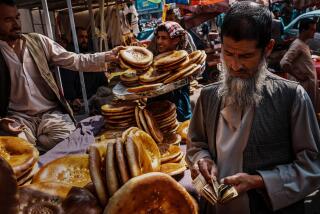West Germany Orders Diplomats Out of Kabul : Food Shortages, Risk of Rebel Attack Help Prompt Bonn’s Action
- Share via
KABUL, Afghanistan — West Germany’s diplomatic staff left Kabul on Saturday under orders from the Bonn government, and Tass said the Soviet Union began an airlift of emergency food supplies to the beleaguered capital.
The West German Foreign Ministry said it told its three diplomats in Kabul to leave because of fears of worsening economic conditions and increased violence as Soviet soldiers leave Afghanistan.
Juergen Chrobog, chief ministry spokesman in Bonn, said the diplomats and their families left Saturday and that the embassy will function “on a reduced status” with a small local staff.
Western diplomatic sources in Kabul, however, said the embassy was closed. That would make it the first foreign mission in Kabul to shut down amid concerns about an economic blockade and possible blood bath after the departure of Soviet troops, expected to be completed next month.
Flight to New Delhi
The sources said the West Germans left on a flight for New Delhi with no advance announcement.
Other Western embassies say they are reviewing their positions now that it appears the Soviets will meet the Feb. 15 deadline for removal of their troops from Afghanistan, where they have been helping government troops fight Muslim guerrillas since December, 1979.
The British Embassy last week told Britons and nationals of six other countries for which it has diplomatic responsibility to leave. The U.S. Embassy has 11 American staff members in Kabul and says the question of whether to stay is “under constant review.”
Tensions Increase
Kabul has been increasingly tense as the withdrawal date for the remaining 50,000 Soviet soldiers approaches and guerrillas close in. Food prices have doubled in recent weeks. Civilians, including young children, stand in bread lines for hours in 20-degree temperatures.
Departing Soviet military forces leave behind a regime stockpiling ammunition for a battle of survival with the guerrillas, who ring the capital in mountain bases and have rejected proposals for a political settlement.
Guerrilla disruptions of convoys of food and supplies, including ammunition, have increased as Soviet troops hand over escort duties and positions to government units along the key Salang Highway from the Soviet border. Bad weather also has held up convoys.
Saturday’s English-language Tass report mentioned “significant shortages because of the effort by the unreconcilable opposition (guerrillas) to organize an economic blockade of the city.” It accused some Kabul traders of engaging in “open sabotage” by hoarding food.
Food Airlift Begins
The official Soviet news agency reported from Kabul that a 3,500-ton airlift of food began Friday. Tass said six flights arrived Saturday in Kabul with flour and other food supplies.
U.N. aid officials welcomed the reported airlift and urged similar help from Western nations, which refuse to deal with the pro-Marxist government of President Najibullah.
“We’re very pleased. This is a beginning,” said Vincent O’Reilly, head of UNICEF in Kabul.
“We’ve heard reports of children dying (from cold) in the bread queues, and we’re very concerned about the dangers of increased malnutrition. . . . This is a humanitarian, not a political issue, and the West should help too.”
Kabul’s daily life has become a tableau of war, suffering, fear and efforts to escape. Amputees hobble in the potholed streets. Afghans cluster at the Indian Embassy for visas.
The bitter Afghan winter is even harder to bear because of the scarcity of food and fuel caused partly by guerrilla attacks on convoys along the Salang Highway.
Giant Soviet transports drop cascades of anti-missile flares as they climb from the Kabul airport, bound for Moscow with soldiers and civilian advisers after delivering cargoes of ammunition.
An average of six planes arrive and depart daily. Hundreds of fully equipped Soviet troops have been seen boarding them.
North of the Salang Pass toward the border, Soviet troops are digging in at new positions, diplomats say, apparently to secure the road for the final withdrawal.
Workers in Kabul are felling an avenue of trees and leveling the ground on either side of a long, wide road that runs from the Darulaman Palace, headquarters of the Defense Ministry, past the Soviet Embassy.
It is wide enough to accommodate small Antonov transport planes, and there is speculation that the Soviets are preparing an emergency airstrip.
Indications are that thousands of Afghans, including supporters or beneficiaries of the current regime, are trying to slip away or make arrangements for quick exits.
Visa Section Closed
The U.S. Embassy shut its visa section last month after a deluge of more than 250 applications a day, compared to five a month last year. Since it stopped issuing visas, lines have formed outside the embassy of India, the nearest country for those who can afford air fare.
Fur-hatted Soviet troops still man mountainside artillery emplacements on Kabul’s outskirts but have handed over some posts on the perimeter road.
An estimated 115,000 Soviet soldiers were in Afghanistan when the withdrawal began May 15 under a U.N.-mediated agreement signed in Geneva. Half were gone by Aug. 15.
Some analysts believe the guerrillas, who have reduced rocket attacks on the capital, are holding off a major assault to let the rest of the Soviets out during the next few weeks.
More to Read
Sign up for Essential California
The most important California stories and recommendations in your inbox every morning.
You may occasionally receive promotional content from the Los Angeles Times.













